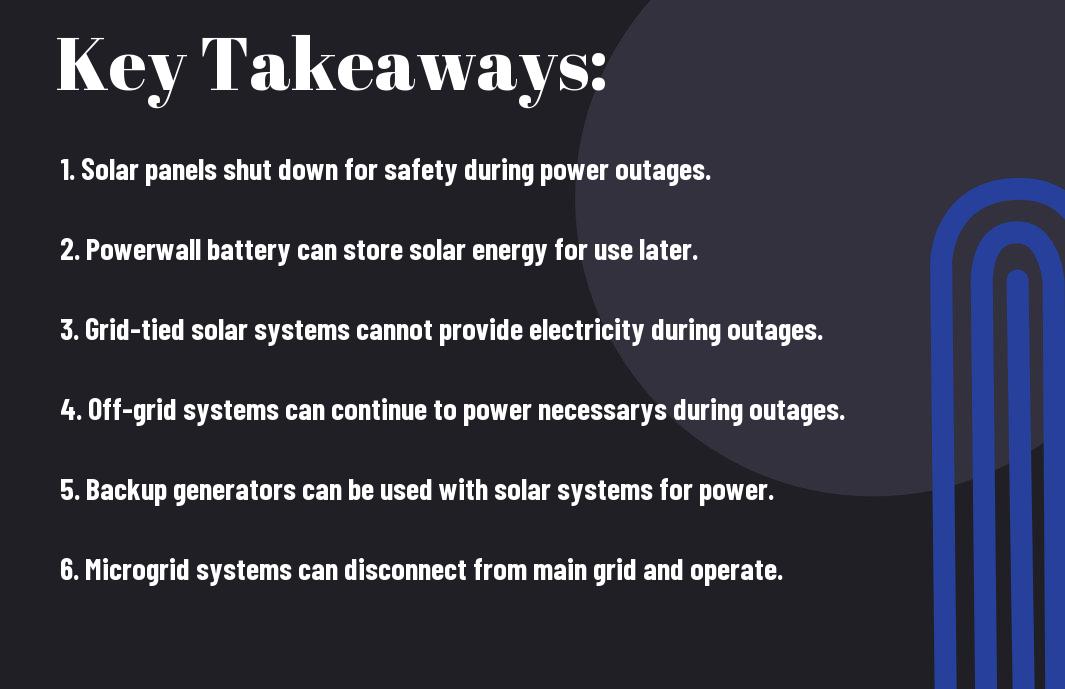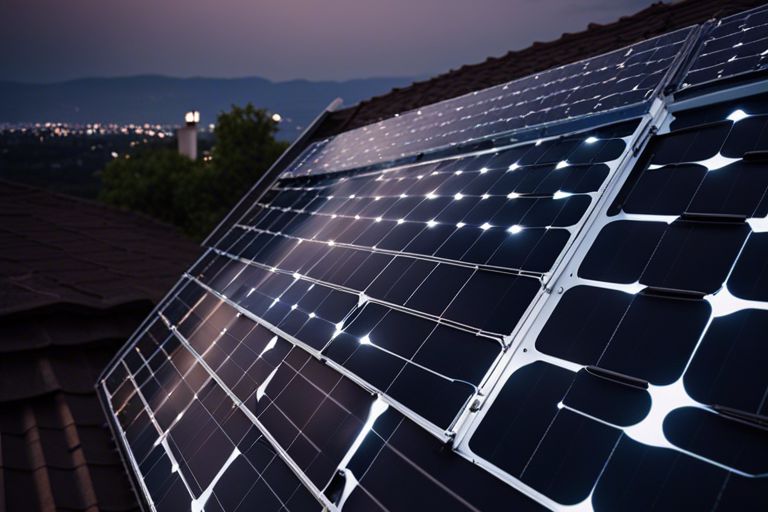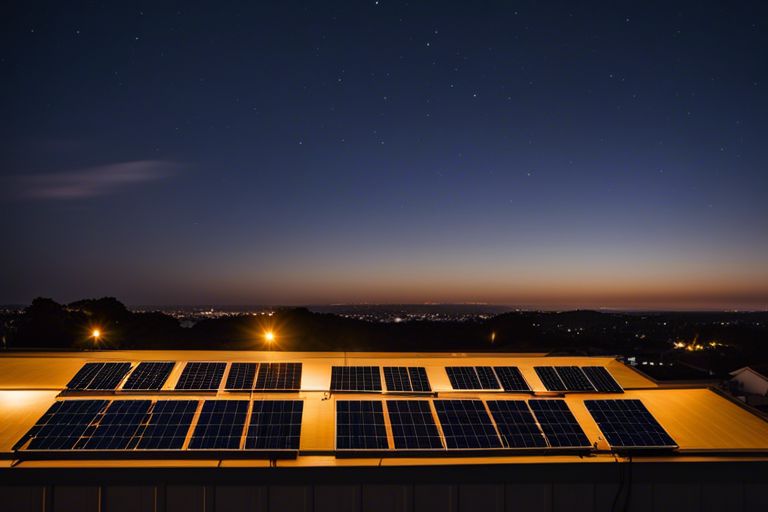There’s no doubt that solar power is a reliable and efficient source of energy, but have you ever wondered what happens to your solar panels during a power outage? In this blog post, we will explore how solar power systems function when the grid goes down and what you can expect in terms of power generation and backup options. Understanding how solar power operates during emergencies can help you better prepare for unexpected situations and ensure that your energy needs are met even when the lights go out.
Key Takeaways:
- Solar power systems are designed to shut down during a power outage: This is a safety measure to protect utility workers from electrical currents being sent back into the grid.
- Battery backup systems can keep solar panels operational: By storing excess energy in batteries, solar power systems can continue to function even during a power outage.
- An off-grid solar power system provides continuous power during an outage: By disconnecting from the grid and relying solely on stored energy, off-grid systems can provide uninterrupted power during blackouts.

How Solar Power Systems Work
Grid-Tied Systems
On a typical sunny day, your solar panels collect energy from the sun and convert it into electricity using photovoltaic cells. This generated electricity is then sent to an inverter, which converts the direct current (DC) into alternating current (AC) that can be used to power your home. If you are connected to the grid, any excess electricity generated by your solar panels can be sent back to the grid for credit through a process called net metering.
Off-Grid Systems
OffGridWhen you have an off-grid solar power system, the solar panels on your property generate electricity during the day. This electricity is stored in batteries for later use, such as during the night or on cloudy days when solar power generation is low. An inverter is also used in off-grid systems to convert the DC electricity from the solar panels into AC electricity for your home’s appliances.
Off-Grid systems are typically used in remote locations where connecting to the grid is not feasible or cost-effective. These systems require careful planning to ensure they are sized correctly to meet your electricity needs and that you have enough battery storage capacity to provide power when the sun is not shining.

What Happens During a Power Outage
Grid-Tied Systems Shut Down
When a power outage occurs, the grid-tied solar power systems automatically shut down. This is a safety feature designed to prevent electricity from flowing back into the grid, which could potentially harm utility workers trying to restore power. So, even though your solar panels might still be soaking up the sun’s rays, they won’t be able to power your home until the grid is back online.
Off-Grid Systems Continue to Generate Power
During a power outage, off-grid solar power systems continue to generate electricity. Since these systems are not connected to the grid, they can operate independently and provide energy to your home even when the grid is down. This means you can still have power for important appliances and devices, helping you weather the outage more comfortably.
Off-grid solar power systems typically include battery storage to store excess energy generated during the day for use at night or during cloudy weather. This means that even when the sun isn’t shining, you can still rely on your solar panels to provide you with electricity, making off-grid systems a reliable choice for backup power during outages.

Why Grid-Tied Systems Shut Down
Safety Concerns
Not all solar power systems are designed to work during a power outage. Grid-tied systems are typically equipped with safety features that automatically shut down during an outage to prevent sending electricity back into the grid. This is a safety measure to protect utility workers who may be working on restoring power in the area.
Grid Stability Issues
To ensure grid stability, grid-tied solar power systems are designed to synchronize with the utility grid. When there is a power outage, the grid-tied system detects the loss of grid power and shuts down to prevent any potential backflow of electricity. The sudden loss of a significant amount of solar power generation could destabilize the grid, causing further complications in restoring power.
One of the main concerns with grid stability during a power outage is the intermittent nature of solar power generation. Solar panels rely on sunlight to produce electricity, and this generation can fluctuate throughout the day. If multiple grid-tied solar systems suddenly come online during a power outage, the rapid increase in power generation could overwhelm the grid, leading to potential safety hazards.
For instance, if the grid is already under stress due to high demand or limited supply, the additional influx of solar power could cause voltage fluctuations or even damage to utility equipment. This is why grid-tied systems are designed to shut down during power outages to prevent such issues and prioritize the safety and stability of the grid.
Can Solar Power Systems Provide Backup Power?
Keep informed about the capabilities of your solar power system during a power outage. If you have doubts, you may wonder, Will Solar Panels Work During a Power Outage? Understanding how your system functions can help you assess its backup power capabilities.
Inverters with Backup Capabilities
With the right setup, some solar power systems have inverters equipped with backup capabilities. These inverters can keep your imperative appliances running during a power outage by converting the DC power from your solar panels into AC power for immediate use in your home. However, it is imperative to check if your system includes this feature and how long it can provide power without sunlight.
Battery Storage Systems
Battery storage systems are another option to consider for backup power with your solar system. These batteries store excess energy generated by your solar panels during the day, which you can then use during times when there is no sunlight or during a power outage. This solution allows you to have a reliable source of backup power even when the sun is not shining.
This backup power option can give you peace of mind knowing that you have a reliable power source in case of emergencies. It also provides flexibility by allowing you to store energy when it is abundant and use it when you need it most, making your solar power system even more efficient and dependable.
Types of Backup Power Systems
Your solar power system can be configured with backup power systems to ensure electricity during power outages. There are different types of backup power systems available, each with its own advantages and considerations. Here are some common options to consider:
| Grid-Tie Systems with Battery Backup | Off-Grid Systems with Generator Backup |
|---|---|
|
|
Grid-Tie Systems with Battery Backup
GridTie Systems with battery backup offer the flexibility of remaining connected to the grid while also having the assurance of backup power during outages. The battery backup system allows you to store excess energy produced by your solar panels for use when sunlight is not available. This type of system typically requires specialized equipment and installation, which can increase the initial cost of your solar power setup. However, having a battery backup ensures that you can have electricity even when the grid is down.
Off-Grid Systems with Generator Backup
Backup power is crucial for Off-Grid Systems, especially when sunlight is limited or during extended power outages. In this setup, a generator serves as a backup power source when the energy stored in batteries is depleted. It’s important to note that relying on a generator for backup power will require fuel, and regular maintenance of both the solar panels and the generator is crucial to ensure uninterrupted power supply. Setting up an Off-Grid System with generator backup may be more complex initially, but it provides reliability during prolonged outages.
Battery: Additionally, incorporating batteries into your solar power system can enhance your backup power capabilities. Batteries store excess energy produced by your solar panels, allowing you to use it when sunlight is not available or during outages. This can provide a more seamless transition to backup power without the need for a generator in Off-Grid Systems.
Benefits and Drawbacks of Solar Power During Outages
Advantages of Solar Power Backup
Many homeowners find that having solar panels with battery backup can be a game-changer during power outages. For starters, you can continue to power crucial appliances like lights, refrigerators, and medical devices even when the grid is down. This can bring peace of mind knowing that you have a reliable power source when you need it the most.
Additionally, having solar power backup can potentially save you money in the long run. By generating your own electricity, you can reduce your reliance on the grid and lower your energy bills. This can be especially beneficial during extended outages when traditional power sources may be unavailable.
Limitations and Considerations
To fully benefit from solar power backup during outages, there are some limitations and considerations to keep in mind. One key factor is the capacity of your battery storage. If you have limited battery capacity, you may only be able to power crucial loads for a short period of time. It’s important to assess your energy needs and invest in a battery system that can support your requirements.
The efficiency of your solar panels can also impact their performance during outages. If your panels are covered in snow, dirt, or shade, they may not be able to generate enough electricity to recharge your batteries effectively. Regular maintenance and cleaning of your solar panels are crucial to ensure they are operating at their full potential.
Final Words
Conclusively, it is important to understand that solar power systems alone cannot provide electricity during a power outage unless they are backed up by energy storage systems such as batteries. While solar panels can continue to generate electricity during daylight hours, without a way to store that energy, you will not be able to use it during a blackout. Investing in a battery storage system can help you make the most out of your solar power setup and provide you with a reliable source of electricity when the grid is down.
FAQ
Q: What happens to solar power during a power outage?
A: During a power outage, grid-tied solar power systems would typically shut down to prevent feeding electricity back into the grid, which could pose a danger to utility workers trying to restore power. However, some solar power systems come equipped with battery backup capabilities to provide electricity during an outage.
Q: How can I ensure my solar power system works during a power outage?
A: To ensure your solar power system continues to provide electricity during a power outage, you can install a battery backup system. This allows excess solar power generated during the day to be stored in batteries and used during times when sunlight is not available, such as at night or during cloudy weather.
Q: Are there any safety considerations for using solar power during a power outage?
A: It is important to follow safety guidelines when using solar power during a power outage. If you have a battery backup system, make sure it is properly maintained and ventilated to prevent overheating. Additionally, consult with a professional to ensure your system is properly installed and in compliance with local regulations to prevent any safety hazards.
